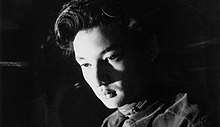Teiji Ito
Teiji Ito (伊藤貞司, Itō Teiji, January 22, 1935 – August 16, 1982) was a Japanese composer and performer. He is best known for his scores for the avant-garde films by Maya Deren.
Teiji Ito | |
|---|---|
伊藤貞司 | |
 | |
| Born | January 22, 1935 |
| Died | August 16, 1982 (aged 47) Haiti |
| Nationality | Japanese |
| Occupation | Composer |
| Years active | 1952-1982 |
| Known for | Film scores for avant-garde artist Maya Deren |
| Spouse(s) | Maya Deren (1960-1961)[1] Gail Ryan Ilene Itō Cherel Winett |
| Children | Tavia Itō[2] |
| Parent(s) | Teiko Ono Yuji Itō |
| Relatives | Genji Itō (brother) Teimoc Johnston-Ono (brother) |
Early life
Ito was born in Tokyo, Japan to a theatrical family.[1] His mother, Teiki Ono, was a dancer and his father, Yuji Ito, was a designer and composer.[3] His family moved to the United States when he was six. Ito accompanied his mother's dance performance at the American Museum of Natural History in New York City; he performed for both Japanese and Korean dance. At 15, he ran away from home.[4] He began to compose at age 17. He met Maya Deren during this time and in 1955, traveled with her to Haiti. There, Ito studied under a master drummer. Ito would also compose the score for Deren's Meshes of the Afternoon at Deren's request.[1] Ito married Deren in 1960 and remained married to her until her death in 1961.[1]
The Japanese American actor Jerry Ito (1927–2007) was Teiji Ito's first cousin.
Career
Ito won an Obie Award for his scores during the 1960-1961 off-Broadway season; the productions included Brecht's In the Jungle of Cities, King Ubu, and Three Modern Japanese Plays. In 1963, he composed the score for the Broadway production of One Flew Over the Cuckoo's Nest. Ito wrote Watermill which was performed by the New York City Ballet in 1971.[2] He had written the book The Japanese Garden : An Approach to Nature in 1972; the book detailed the basic elements of a Japanese garden.[4] Ito also performed and composed for Jean Erdman's Theater of the Open Eye.[2]
Ito and his fourth wife, Cherel, edited Deren's 1947-1951 footage she shot while in Haiti; this would result in the documentary Divine Horsemen: The Living Gods of Haiti.[5][6]
Death
While in Haiti, Ito died of a heart attack in 1982.[2]
Discography
- Meshes: Music For Films and Theater (O.O. Discs)
- Music For Maya: Early Film Music Of Teiji Ito (Tzadik Records, 2-CD set)
- King Ubu (Tzadik)
- The Shamanic Principles (Tzadik)
- Tenno (Tzadik)
- Watermill (Tzadik)
References
- Robertson, Robert (2015). Cinema and the audiovisual imagination : music, image, sound. London ; New York: I.B. Tauris & Co Ltd. pp. 76–77. ISBN 9781780767178. Retrieved 15 January 2016.
- "Teiji Ito, 47, Composer For Theater and Dance". Arthur Ochs Sulzberger. The New York Times Company. August 21, 1982. Retrieved 16 January 2016.
- Anderson, Jack (April 27, 2001). "Genji Ito, 54, Theater Composer Known for Stylistic Diversity". Arthur Ochs Sulzberger, Jr. New York Times Company. Retrieved 15 January 2016.
- Layne, Joslyn. "About Teiji Ito". MTV. Viacom. Retrieved 15 January 2016.
- Rich, B Ruby (1998). Chick Flicks: Theories and Memories of the Feminist Film Movement. Durham: Duke University Press. p. 52. ISBN 9780822321064. Retrieved 16 January 2016.
- "Paid Notice: Deaths ITO, CHEREL WINETT". Arthur Ochs Sulzberger. New York Times Company. January 17, 1999. Retrieved 16 January 2016.
External links
- Teiji Ito on IMDb
- Works by or about Teiji Ito in libraries (WorldCat catalog)
- Teiji Ito Tzadik discs
- Collection of noncommercial recordings from The New York Public Library for the Performing Arts